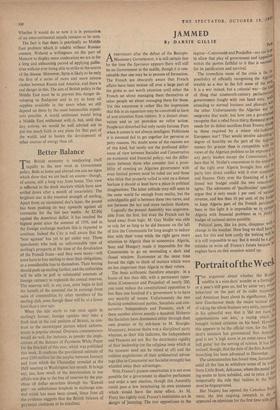JAMMED
By DARSIE GILLIE
AFORTNIG FIT after the defeat of the Bourges- Maunoury Government, it is still certain that by the time the Spectator appears there will still be no Government in the saddle, though it is con- ceivable that one may be in process of formation. The French are obscurely aware that French affairs have been written off over a large part of the globe as not worth attention until either the French set about managing them themselves or other people set about managing them for them. Yet this awareness is rather like the impression that fish in an aquarium may be conceived to have of non-attention from visitors. It is distant obser- vation and as yet provokes no reflex action. People are disturbed but only rarely furious. Fury when it comes is not always intelligent. Politicians it is assumed fail to get together for perverse or petty reasons. No doubt some of the reasons are of this kind, but surely not the profound differ- ences of view between Socialist and Conservative on economic and financial policy; not the differ- ences between those who consider that a possi- bility of creating an Algerian government with even limited powers must be ruled out and those who think that properly veiled in mist on a distant horizon it should at least have a place in political imaginations. The latter attitude may still seem to the outer world far enough from reality, but the unbridgeable gulf is between these two views, and not between the last and more realistic thinkers.
Logically the present Assembly was ungovern- able from the first, but even the French can be lured away from logic. M. Guy Mollet was able to rule for as long as he did because on the left of him the Communists for long sought to seduce him with their votes while the right gave more attention to Algeria than to economics. Algeria, Suez and Hungary made it impossible for the Communists to go on serenading a dark and closed window. Economics at the same time forced the right to think of matters which were no less important than Algeria to their voters.
The basic arithmetic therefore emerges : in a house of less than 600, with a permanent oppo- sition (Communist and Poujadist) of nearly 200, you must reduce the constitutional opposition to less than one hundred if a government is to have any security of tenure. Unfortunately the two flanking constitutional parties, Socialists and con- servative Independents and Peasants, each of them number almost exactly a hundred. Hitherto the Socialists have dominated either through their own premier or by sub-lease to M. Bourges- Maunoury, because theirs was a disciplined party whereas, as their title indicates, the Independents and Peasants are not. But the doctrinaire rigidity of their leadership (on the religious issue which at the moment need not be raised at all) and the ruthless exploitation of their arithmetical advan- tage,(due to Communist not Socialist strength) has whittled away their advantages.
With France's present constitution it is not even possible for a government to dissolve parliament and order a new election, though this Assembly could pass a law terminating its own existence which would have the same effect. As M.
Pinay has rightly said, France's institutions are in danger of jamming. The two oppositions to the regime—Communist and Poujadist—are too large ° ppositioll to allow that play of government and o within the parties faithful to it that is necessarY for its justification and survival. ll The immediate cause of the crisis is the ii' possibility of officially recognising the Alger trouble as a war in the full sense of the tert1_1", It is a war indeed, but a colonial war—the law of thing that nineteenth-century parliamenlall governments fought with one hand only, v4t,, attending to normal business and pleasure WI the other. Unfortunately the Algerian war h' outgrown that scale; but how can a governnieri recognise that a rebel force thirty thousand str04 needs for its defeat sacrifices from France sifilll to those required by a minor old-fashion European war? That would involve admitting 1 degree of hostility on the part of the Algeria! masses far greater than is compatible with 0 views of the Algerian problem so far expressed ll any party leaders except the Communists. 11 Is here that M. Mollet's concessions to the emotOt of the right over Algeria brought him and I$ party into direct conflict with it over econontli' and finance. Only over the financing of a Or fessed war budget could the two conceivah:Y agree. The advocates of 'pacification' speciolls argue that it only needs 1 per cent. of natiorl revenue, and less than 10 per cent. of the bagel to keep Algeria part of the French patrimol Seen in this light it is impossible so to connee Algeria with financial problems as to ,make budget of national union possible. Political jams, like ice jams, disappear with II change in the weather. How long we shall Wel° wait for this and how costly the waiting will he't it is still impossible to say. But it would be a mistake to write off France's future because Is' engines have on this occasion seized up.


































 Previous page
Previous page